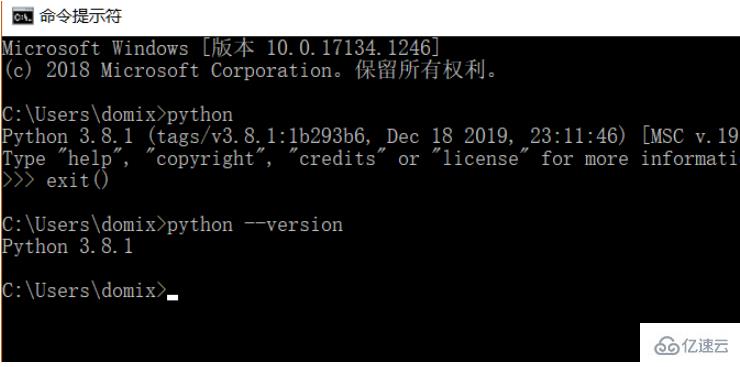您好,登錄后才能下訂單哦!
您好,登錄后才能下訂單哦!
本篇內容主要講解“Python爬蟲Requests庫如何使用”,感興趣的朋友不妨來看看。本文介紹的方法操作簡單快捷,實用性強。下面就讓小編來帶大家學習“Python爬蟲Requests庫如何使用”吧!
1、安裝 requests 庫
因為學習過程使用的是 Python 語言,需要提前安裝 Python ,我安裝的是 Python 3.8,可以通過命令 python --version 查看自己安裝的 Python 版本,建議安裝 Python 3.X 以上的版本。

安裝好 Python 以后可以 直接通過以下命令安裝 requests 庫。
pip install requests
Ps:可以切換到國內的pip源,例如阿里、豆瓣,速度快
為了演示功能,我這里使用nginx模擬了一個簡單網站。
下載好了以后,直接運行根目錄下的 nginx.exe 程序就可以了(備注:windows環境下)。
這時本機訪問 :http://127.0.0.1 ,會進入 nginx 的一個默認頁面。

2、獲取網頁
下面我們開始用 requests 模擬一個請求,獲取頁面源代碼。
import requestsr = requests.get('http://127.0.0.1')print(r.text)執行以后得到的結果如下:
<!DOCTYPE html><html><head><title>Welcome to nginx!</title><style> body { width: 35em; margin: 0 auto; font-family: Tahoma, Verdana, Arial, sans-serif; }</style></head><body><h3>Welcome to nginx!</h3><p>If you see this page, the nginx web server is successfully installed andworking. Further configuration is required.</p>
<p>For online documentation and support please refer to<a href="http://nginx.org/">nginx.org</a>.<br/>Commercial support is available at<a href="http://nginx.com/">nginx.com</a>.</p>
<p><em>Thank you for using nginx.</em></p></body></html>3、關于請求
常見的請求有很多種,比如上面的示例使用的就是 GET 請求,這里詳細介紹一下這些常見的請求方法。
4、GET 請求
4.1、發起請求
我們使用相同的方法,發起一個 GET 請求:
import requests r = requests.get('http://httpbin.org/get') print(r.text)返回結果如下:
{"args": {}, "headers": {"Accept": "*/*", "Accept-Encoding": "gzip, deflate", "Host": "httpbin.org", "User-Agent": "python-requests/2.23.0", "X-Amzn-Trace-Id": "Root=1-5f846520-19f215aa46213a2b4241c18a" }, "origin": "xxxx", "url": "http://httpbin.org/get"}通過返回結果,我們可以看到返回結果所包括的信息有:Headers、URL、IP等。
4.2、添加參數
平時我們訪問的 URL 會包含一些參數,比如:id是100,name是YOOAO。正常的訪問,我們會編寫如下 URL 進行訪問:
http://httpbin.org/get?id=100&name=YOOAO
顯然很不方便,而且參數多的情況下會容易出錯,這時我們可以通過 params 參數優化輸入內容。
import requests data = { 'id': '100', 'name': 'YOOAO'} r = requests.get('http://httpbin.org/get', params=data) print(r.text)這是執行代碼返回的結果如下:
{"args": {"id": "100", "name": "YOOAO" }, "headers": {"Accept": "*/*", "Accept-Encoding": "gzip, deflate", "Host": "httpbin.org", "User-Agent": "python-requests/2.23.0", "X-Amzn-Trace-Id": "Root=1-5f84658a-1cd0437b4cf34835410d7161" }, "origin": "xxx.xxxx.xxx.xxx", "url": "http://httpbin.org/get?id=100&name=YOOAO"}通過返回結果,我們可以看到,通過字典方式傳輸的參數被自動構造成了完整的 URL ,不需要我們自己手動完成構造。
4.3、返回結果處理
返回結果是 json 格式,因此我們可以使用調用 json 的方法來解析。如果返回內容不是 json 格式,這種調用會報錯。
import requests
r = requests.get('http://httpbin.org/get') print(type(r.text)) print(type(r.json()))返回結果:
<class 'str'><class 'dict'>
4.4、內容抓取
這里我們使用簡單的正則表達式,來抓取nginx示例頁面種所有< a >標簽的內容,代碼如下:
import requestsimport re
r = requests.get('http://127.0.0.1')pattern = re.compile('<a.*?>(.*?)</a>', re.S)a_content = re.findall(pattern, r.text)print(a_content)抓取結果:
['nginx.org', 'nginx.com']
這里一次簡單的頁面獲取和內容抓取就完成了,
4.5、數據文件下載
上面的示例,返回的都是頁面信息,如果我們想獲取網頁上的圖片、音頻和視頻文件,我們就需要學會抓取頁面的二進制數據。我們可以使用 open 方法來完成圖片等二進制文件的下載,示例代碼:
import requests
r = requests.get('http://tu.ossfiles.cn:9186/group3/M00/09/FB/rBpVfl8QFLOAYhhcAAC-pTdNj7g471.jpg')with open('image.jpg', 'wb') as f: f.write(r.content)print('下載完成')open 方法中,它的第一個參數是文件名稱,第二個參數代表以二進制的形式打開,可以向文件里寫入二進制數據。
運行結束以后,會在運行文件的同級文件夾下保存下載下來的圖片。運用同樣原理,我們可以處理視頻和音頻文件。
4.6、添加headers
在上面的示例中,我們直接發起的請求,沒有添加 headers ,某些網站為因為請求不攜帶請求頭而造成訪問異常,這里我們可以手動添加 headers 內容,模擬添加 headers 中的 Uer-Agent 內容代碼:
import requests
headers = {'User-Agent':'Mozilla/5.0 (Macintosh; Intel Mac OS X 10_8_3) AppleWebKit/537.36 (KHTML, like Gecko) Chrome/27.0.1453.93 Safari/537.36'}r = requests.get('http://httpbin.org/get', headers=headers)print(r.text)執行結果:
{"args": {}, "headers": {"Accept": "*/*", "Accept-Encoding": "gzip, deflate", "Host": "httpbin.org", "User-Agent": "Mozilla/5.0 (Macintosh; Intel Mac OS X 10_8_3) AppleWebKit/537.36 (KHTML, like Gecko) Chrome/27.0.1453.93 Safari/537.36", "X-Amzn-Trace-Id": "Root=1-5ec8f342-8a9f986011eac8f07be8b450" }, "origin": "xxx3.xx.xxx.xxx", "url": "http://httpbin.org/get"}結果可見,User-Agent 的值變了。不是之前的:python-requests/2.23.0。
5、POST 請求
GET請求相關的知識都講完了,下面講講另一個常見的請求方式:POST請求。
使用 requests 實現 POST 請求的代碼如下:
import requestsdata = { 'id': '100', 'name': 'YOOAO'}
r = requests.post("http://httpbin.org/post", data=data)print(r.text)結果如下
{"args": {}, "data": "", "files": {}, "form": {"id": "100", "name": "YOOAO" }, "headers": {"Accept": "*/*", "Accept-Encoding": "gzip, deflate", "Content-Length": "17", "Content-Type": "application/x-www-form-urlencoded", "Host": "httpbin.org", "User-Agent": "python-requests/2.23.0", "X-Amzn-Trace-Id": "Root=1-5ec8f4a0-affca27a05e320a84ca6535a" }, "json": null, "origin": "xxxx", "url": "http://httpbin.org/post"}從 form 中我們看到了自己提交的數據,可見我們的 POST 請求訪問成功。
6、響應
訪問URL時,有請求就會有響應,上面的示例使用 text 和 content 獲取了響應的內容。除此以外,還有很多屬性和方法可以用來獲取其他信息,比如狀態碼、響應頭、Cookies 等。
import requests
r = requests.get('http://127.0.0.1/')print(type(r.status_code), r.status_code)print(type(r.headers), r.headers)print(type(r.cookies), r.cookies)print(type(r.url), r.url)print(type(r.history), r.history)關于狀態碼,requests 還提供了一個內置的狀態碼查詢對象 requests.codes,用法示例如下:
import requestsr = requests.get('http://127.0.0.1/')exit() if not r.status_code == requests.codes.ok else print('Request Successfully')==========執行結果==========Request Successfully這里通過比較返回碼和內置的成功的返回碼,來保證請求得到了正常響應,輸出成功請求的消息,否則程序終止。
這里我們用 requests.codes.ok 得到的是成功的狀態碼 200。
這樣的話,我們就不用再在程序里面寫狀態碼對應的數字了,用字符串表示狀態碼會顯得更加直觀。
下面是響應碼和查詢條件對照信息:
# 信息性狀態碼 100: ('continue',), 101: ('switching_protocols',), 102: ('processing',), 103: ('checkpoint',), 122: ('uri_too_long', 'request_uri_too_long'),
# 成功狀態碼 200: ('ok', 'okay', 'all_ok', 'all_okay', 'all_good', '\\o/', '?'), 201: ('created',), 202: ('accepted',), 203: ('non_authoritative_info', 'non_authoritative_information'), 204: ('no_content',), 205: ('reset_content', 'reset'), 206: ('partial_content', 'partial'), 207: ('multi_status', 'multiple_status', 'multi_stati', 'multiple_stati'), 208: ('already_reported',), 226: ('im_used',),
# 重定向狀態碼 300: ('multiple_choices',), 301: ('moved_permanently', 'moved', '\\o-'), 302: ('found',), 303: ('see_other', 'other'), 304: ('not_modified',), 305: ('use_proxy',), 306: ('switch_proxy',), 307: ('temporary_redirect', 'temporary_moved', 'temporary'), 308: ('permanent_redirect', 'resume_incomplete', 'resume',), # These 2 to be removed in 3.0
# 客戶端錯誤狀態碼 400: ('bad_request', 'bad'), 401: ('unauthorized',), 402: ('payment_required', 'payment'), 403: ('forbidden',), 404: ('not_found', '-o-'), 405: ('method_not_allowed', 'not_allowed'), 406: ('not_acceptable',), 407: ('proxy_authentication_required', 'proxy_auth', 'proxy_authentication'), 408: ('request_timeout', 'timeout'), 409: ('conflict',), 410: ('gone',), 411: ('length_required',), 412: ('precondition_failed', 'precondition'), 413: ('request_entity_too_large',), 414: ('request_uri_too_large',), 415: ('unsupported_media_type', 'unsupported_media', 'media_type'), 416: ('requested_range_not_satisfiable', 'requested_range', 'range_not_satisfiable'), 417: ('expectation_failed',), 418: ('im_a_teapot', 'teapot', 'i_am_a_teapot'), 421: ('misdirected_request',), 422: ('unprocessable_entity', 'unprocessable'), 423: ('locked',), 424: ('failed_dependency', 'dependency'), 425: ('unordered_collection', 'unordered'), 426: ('upgrade_required', 'upgrade'), 428: ('precondition_required', 'precondition'), 429: ('too_many_requests', 'too_many'), 431: ('header_fields_too_large', 'fields_too_large'), 444: ('no_response', 'none'), 449: ('retry_with', 'retry'), 450: ('blocked_by_windows_parental_controls', 'parental_controls'), 451: ('unavailable_for_legal_reasons', 'legal_reasons'), 499: ('client_closed_request',),
# 服務端錯誤狀態碼 500: ('internal_server_error', 'server_error', '/o\\', '?'), 501: ('not_implemented',), 502: ('bad_gateway',), 503: ('service_unavailable', 'unavailable'), 504: ('gateway_timeout',), 505: ('http_version_not_supported', 'http_version'), 506: ('variant_also_negotiates',), 507: ('insufficient_storage',), 509: ('bandwidth_limit_exceeded', 'bandwidth'), 510: ('not_extended',), 511: ('network_authentication_required', 'network_auth', 'network_authentication')7、SSL 證書驗證
現在很多網站都會驗證證書,我們可以設置參數來忽略證書的驗證。
import requests
response = requests.get('https://XXXXXXXX', verify=False)print(response.status_code)或者制定本地證書作為客戶端證書:
import requests
response = requests.get('https://xxxxxx', cert=('/path/server.crt', '/path/server.key'))print(response.status_code)注意:本地私有證書的 key 必須是解密狀態,加密狀態的 key 是不支持的。
8、設置超時
很多時候我們需要設置超時時間來控制訪問的效率,遇到訪問慢的鏈接直接跳過。
示例代碼:
import requests# 設置超時時間為 10 秒r = requests.get('https://httpbin.org/get', timeout=10)print(r.status_code)將連接時間和讀取時間分開計算:
r = requests.get('https://httpbin.org/get', timeout=(3, 10))不添加參數,默認不設置超時時間,等同于:
r = requests.get('https://httpbin.org/get', timeout=None)9、身份認證
遇到一些網站需要輸入用戶名和密碼,我們可以通過 auth 參數進行設置。
import requests from requests.auth import HTTPBasicAuth # 用戶名為 admin ,密碼為 admin r = requests.get('https://xxxxxx/', auth=HTTPBasicAuth('admin', 'admin')) print(r.status_code)簡化寫法:
import requests
r = requests.get('https://xxxxxx', auth=('admin', 'admin'))print(r.status_code)10、設置代理
如果頻繁的訪問某個網站時,后期會被一些反爬程序識別,要求輸入驗證信息,或者其他信息,甚至IP被封無法再次訪問,這時候,我們可以通過設置代理來避免這樣的問題。
import requests
proxies = { "http": "http://10.10.1.10:3128", "https": "http://10.10.1.10:1080",}
requests.get("http://example.org", proxies=proxies)若你的代理需要使用HTTP Basic Auth,可以使用
http://user:password@host/ 語法:
proxies = { "http": "http://user:pass@10.10.1.10:3128/",}要為某個特定的連接方式或者主機設置代理,使用 scheme://hostname 作為 key, 它會針對指定的主機和連接方式進行匹配。
proxies = {'http://10.20.1.128': 'http://10.10.1.10:5323'}到此,相信大家對“Python爬蟲Requests庫如何使用”有了更深的了解,不妨來實際操作一番吧!這里是億速云網站,更多相關內容可以進入相關頻道進行查詢,關注我們,繼續學習!
免責聲明:本站發布的內容(圖片、視頻和文字)以原創、轉載和分享為主,文章觀點不代表本網站立場,如果涉及侵權請聯系站長郵箱:is@yisu.com進行舉報,并提供相關證據,一經查實,將立刻刪除涉嫌侵權內容。